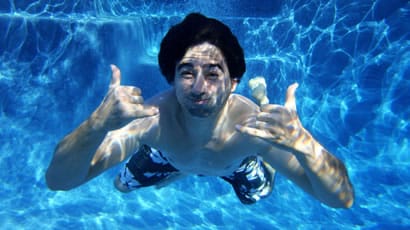Making your tank last longer while scuba diving
While scuba diving, making your air last long is a important to divers. Why? Because it means more bottom time and a longer dive. It is also something that divers often bring up when diving in groups. Nobody wants to be buddied up with the air hog or air pig or whatever you are referred to.
When your air lasts longer you will:
- Have longer dive times
- See more marine life
- Be comfortable with more advanced dives
- Become a more confident scuba diver
Here are 10 ways of conserving air when Scuba Diving-
1. Breathe slowly and deeply. Learning how to breathe properly underwater with your diving equipment is the best way of conserving your air when you dive. The longer and deeper breaths you take, the more opportunity your body has to absorb the oxygen out of it before it is exhaled. You should never be consciously trying to hold your breath or go without oxygen. A lot of people while they are beginning to become conscious with this will count how long each inhalation takes and how long each exhale takes. The longer the better as long as it doesn’t lead you to become short on breath after a few reps.
2. Buoyancy Control. If you are spending all of your time and energy fighting to stay at the bottom or constantly having to add air to your BCD to keep yourself off of the bottom this is a problem. All of this extra energy that is used directly relates to how much oxygen your body needs in order to keep itself going. Obviously if you aren’t inflating and deflating your BCD very often you will be using less air from you BCD which you will then still have in your tank to breathe!
3. Hydrodynamics. Make sure you have nothing loose hanging off of you while diving. Swim in a horizontal position with your arms by your side. Just like on land where streamlining is important it is in the water as well. Wear tight fitting gear that reduces the drag to make cutting through the water as easy as possible.
4. Take Your Time. Scuba diving is not a race. It isn’t a competitive sport. Go at a pace that you won’t be out of breath at and don’t worry about how much ground you cover. If you find yourself out of breath while diving it is a clear sign that you are sucking back the oxygen out of your tank and you won’t be down as long as you might hope.
5. Use the Snorkel on the Surface. If you are at a dive site where you are spending some time on the surface and you want to keep the waves from splashing in your face, throw on the snorkel. It keeps you from taking breaths from your regulator, which will of course give you some extra once you are actually diving.
6. Don’t go as deep. Want to get a bit longer out of your tank while diving with friends? Stay a few feet above them for the majority of the dive. If you remember back to when you got certified, there is a direct correlation between how deep you are and how much air is being taken out of your tank with each breath.
7. Fins. Your feet should be the main thing that propels you underwater. It makes sense then to not skimp out and go for the cheapest fins. Try a few out and find out which ones are best for you. The more efficient your fins are, the more efficient each movement you make is and the less energy you will use.
8. Plan your dive! Use the currents to your advantage. Plan your dive keeping in mind that currents do exist and make the most of them when choosing the direction you want to go. The most extreme example of this is drift diving. Just make sure you have a competent boat captain at the surface. It is amazing the distant you can travel using no energy at all when the ocean is helping you. In the case of surge, find out what is best for you. Don’t fight too hard. Often you will find that maintaining your place while the surge is pulling you back and then relaxing while it surges you forward is a great way to deal with this.
9. Reduce leaks. Check your equipment regularly by qualified personnel to ensure that it is working at its best and has no leaks or faults. Not only does it reduce the leaks, it gives you peace of mind knowing your gear is functioning well. Peace of mind is never a bad thing to have while diving!







